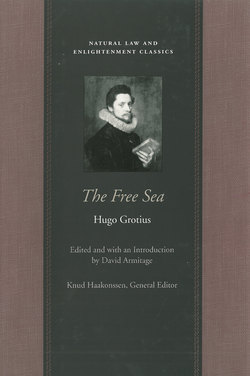Читать книгу The Free Sea - Hugo Grotius - Страница 8
На сайте Литреса книга снята с продажи.
ОглавлениеA NOTE ON THE TEXTS
Hugo Grotius, The Free Sea, trans. Richard Hakluyt
There have been only two English translations of Mare Liberum. The last was in 1916, as part of the series of classics in the history of international law published by the Carnegie Endowment for International Peace.1 This translation was avowedly a product of debates on neutral shipping during the First World War: “Since the month of August, 1914, the expression ‘Freedom of the Seas’ has been on the lips of belligerent and neutral, and it seems as advisable as it is timely to issue—for the first time in English—the famous Latin tractate of Grotius proclaiming, explaining, and in no small measure making the ‘freedom of the seas.’”2 However, though the Carnegie Endowment’s edition may have been the first translation “issue[d]” in English, it was not the only, or even the first, English translation. That had been undertaken three hundred years before by the great English memorialist of overseas activity and promoter of English trade and colonization Richard Hakluyt the younger.3
The manuscript of the translation in the Inner Temple Library in London (MS Petyt 529) is a fair copy in Hakluyt’s own hand. The twenty-six-leaf quarto was originally bound in vellum, of which a small patch survives containing the title “Mare liberum / The free Sea.” The flyleaf notes that it was “Translated into English by Mr Rich: Hackluyt &c.”4 Only brief extracts from the translation have ever been printed.5 It has attracted little commentary from Hakluyt scholars and remains entirely unknown to scholars of Grotius, let alone to any wider readership. This edition therefore represents the first publication of an unknown contemporary translation of a major work in the history of political thought by a translator of historical significance in his own right.
The Free Sea was one of only three book-length translations Hakluyt himself undertook. The two others—from the French and Portuguese—both appeared in print during Hakluyt’s lifetime.6 The only translation from the Latin—of a linguistic manual for European travelers to the East Indies—with which his name has been associated was commissioned by the English East India Company in 1614.7 It is unclear whether Hakluyt was responsible for the translation or was simply the agent by which it reached the company.8 It is nonetheless possible that The Free Sea was the result of a commission from the company. The arguments of The Free Sea could just as easily have supported the English company’s claims against the Portuguese as the VOC’s and were, moreover, used during the Anglo-Dutch colonial conferences of 1613 and 1615 to combat Dutch pretensions to exclusive access to the East Indies. However, no payments to Hakluyt for a translation are recorded in the Court Books of the East India Company. Until further evidence is discovered, the occasion for his translation and the reason it was not published can only be matters for speculation. All that is certain is that the translation can have been undertaken no earlier than the publication of Mare Liberum in the spring of 1609 and no later than Hakluyt’s death in November 1616.
It has been said that Hakluyt “stood very high in the two aspects of translation concerning which modern readers are most demanding. The one is mastery of technical vocabulary; the other is unraveling of complicated syntax.”9 Neither of these qualities is conspicuous in his translation of The Free Sea. Hakluyt’s occasional mistranslations reveal his ignorance of the technical vocabulary of the law, particularly Roman law; Grotius’s original Latin has been included as necessary in the footnotes to clarify these mistranslations. Hakluyt’s translation is also quite literal in its adherence to Grotius’s Latin syntax; to clarify the meaning of the text, spelling and punctuation have been modernized throughout.
The Inner Temple manuscript is a fair copy but contains a few minor emendations by Hakluyt himself; these have been silently incorporated into the text. The manuscript does not include Grotius’s marginal annotations; these have been supplied from the 1609 text of Mare Liberum and have been expanded, supplemented, and corrected as necessary.
Editorial additions to the text are indicated by square brackets.
William Welwod, “Of the Community and Propriety of the Seas” (1613)
William Welwod was professor of mathematics and of civil law at the University of St. Andrews in Scotland and produced the first British treatise on the law of the sea, in 1590.10 His reply to Chapter V of Mare Liberum comprised Chapter XXVII of his next work on maritime law, An Abridgement of All Sea-Lawes (1613).11 Two years later, he expanded his criticisms of Grotius at the behest of Anne of Denmark, the wife of King James VI and I, in his De dominio maris (1615).12 The text printed here is a modernized version of Chapter XXVII of Welwod’s Abridgement, with Welwod’s marginal references expanded and amended to follow current practices for citing classical, biblical, and Roman law texts.
Hugo Grotius, “Defense of Chapter V of the Mare Liberum” (ca. 1615), trans. Herbert F. Wright
The manuscript of Grotius’s reply to Welwod, like that of De Jure Praedae, was discovered in 1864 among the de Groot family papers.13 Entitled the “Defensio capitis quinti Maris Liberi oppugnati a Guilielmo Welwodo capite XXVII ejus libri … cui titulum fecit Compendium Legum Maritimarum,” it was first printed in 1872 and was translated into English in 1928.14 This edition substantially reproduces this translation, except that quotations from The Free Sea and from Welwod’s reply have been taken from the texts printed in this edition.
